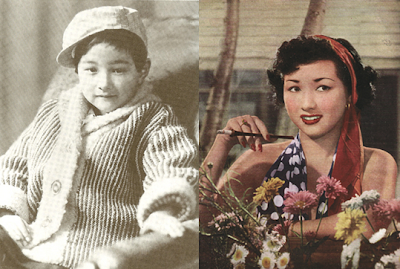 by Chris MaGee
by Chris MaGee2010 was a particularly difficult year for Japanese film with the industry losing some of its biggest talents including actor Kei Sato, art director Takeo Kimura and animators Satoshi Kon and Kihachiro Kawamoto. It was on the eve of 2011 htough that one of Japanese film's brightest lights went out with the passing of legendary actress Hideko Takamine. Takamine, the star of such classic films as Keisuke Kinoshita's "Twenty-four Eyes" and Mikio Naruse's "When a Woman Ascends the Stairs" had been living in seclusion for a number of years since retiring from acting in 1979. It was on New Year's Eve that it was announced that Takamine had lost her battle with lung cancer and passed away at a Tokyo hospital early on the morning of December 28th. She was 86.
Takamine was born in Hakodate, Hokkaido in 1924 and started her film career early. At the age of only 5 she joined Shochiku and made her screen debut in Hotei Nomura's film "Mother (Haha)". Japanese film audiences immediately fell in love with the bob-haired youngster (below left) and Takamine found herself starring in films made by such legendary directors as Yasujiro Ozu (Tokyo Chorus), Yasujiro Shimazu (Revue no shimai, Reijin) and Heinosuke Gosho (Dai-Tokyo no ikkaku). In these early years Deko-chan, as she was nicknamed by the public, was often compared to American child star Shirley Temple, but unlike Temple the young Takamine would play both female and male roles until she hit puberty.
 In 1937 the now teenage Takamine would shift studios and leave Shochiku for Toho, and over the next decade her public persona would slowly be transformed from an androgynous child star to a WW2 pin-up starlet. During this time she was starring alongside Golden Age screen actor Denjiro Okochi in Nobuo Nakagawa's "Shinpen Tange Sazen: Sekigan no maki", working with veteran film-maker Masahiro Makino and befriending the young Setsuko Hara (whose career would shortly take her to Takamine's old home at Shochiku). It was in the early 1940's, just about the same time that her singing career was getting just as much attention as her acting career, Takamine would meet a man who would have a profound effect on her life and work. In 1941 Takamine was cast in Mikio Naruse's film "Hideko: the Bus Conductress". This would be the first of a 17 films that Takamine would work on with Naruse over the next quarter century including such classics as "Lightning", "Mother", "When a Woman Ascends the Stairs" and "Flowing", but it wasn't always the smoothest of creative partnerships. Takamine was quoted as saying that the famously taciturn Naruse was "a person whose refusal to talk was downright malicious."
In 1937 the now teenage Takamine would shift studios and leave Shochiku for Toho, and over the next decade her public persona would slowly be transformed from an androgynous child star to a WW2 pin-up starlet. During this time she was starring alongside Golden Age screen actor Denjiro Okochi in Nobuo Nakagawa's "Shinpen Tange Sazen: Sekigan no maki", working with veteran film-maker Masahiro Makino and befriending the young Setsuko Hara (whose career would shortly take her to Takamine's old home at Shochiku). It was in the early 1940's, just about the same time that her singing career was getting just as much attention as her acting career, Takamine would meet a man who would have a profound effect on her life and work. In 1941 Takamine was cast in Mikio Naruse's film "Hideko: the Bus Conductress". This would be the first of a 17 films that Takamine would work on with Naruse over the next quarter century including such classics as "Lightning", "Mother", "When a Woman Ascends the Stairs" and "Flowing", but it wasn't always the smoothest of creative partnerships. Takamine was quoted as saying that the famously taciturn Naruse was "a person whose refusal to talk was downright malicious."Besides the defining films that she made with Naruse Takamine would also work repeatedly with director Keisuke Kinoshita. Takamine would play the lead role in Kinoshita's 1951 musical comedy "Carmen Comes Home" (above right), Japan's first colour film, as well as one of the most popular films in Japanese history, 1954's "Twenty-four Eyes". The story of Ms. Oishi, a small town school teacher whose class grows up to endure the hardships of WW2, "Twenty-four Eyes" was named the best film of 1954 by Kinema Junpo and won Takamine best actress honours by both the Mainichi Film Concours and The Blue Ribbon Awards. Takamine would become so wildly popular due to her role as Ms. Oishi that she was invited to provide celebrity guest commentary during the live television broadcast of the 1959 royal wedding between Crown Prince Akihito and Princess Michiko.
Takamine would continue to act in films, many of them directed by her husband Zenzo Matsuyama, until the late 1970's. After starring in Keisuke Kinoshita's 1979 film "My Son! My Son!" Takamine would hold a press conference to announce her retirement from acting, leaving behind a film legacy that few actresses, Japanese or otherwise have ever achieved.
Our deepest condolences go to Takamine's family, colleagues and to all of her many fans worldwide (of whom we all count ourselves among). We leave you with the trailer for Takamine's best known film "Twenty-four Eyes" as well as the hit theme song from the 1949 film "Ginza Kankan Musume" sung by Takamine herself. Our thanks go to Japan Today for the details of Takamine-san's remarkable life.
Twenty-four Eyes (MoC Trailer)
Ginza Can-Can Girl (1949)


























1 comment:
Sorry! Misspelled Takamin-san's name in a sentence in this post. A stupid oversight. All fixed now. Our apologies!
Post a Comment